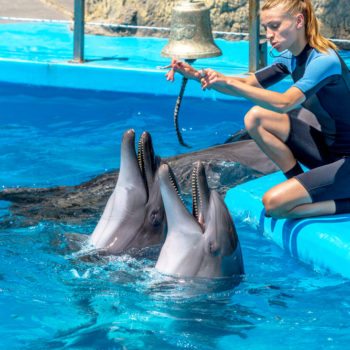Why We Love It
-
$51,200Potential Avg. Salary
-
9.9%Job Growth Rate
-
Growing DemandJob Outlook
-
Creativity FocusedCareer Attribute
Party planners perform many of the same responsibilities as event planners. However, while event planners commonly plan events for businesses, party planners typically work for private events, planning the details for birthday parties, anniversaries, graduations, retirements, and other parties.
Recommended Schools
What is a Party Planner?
The following job responsibilities are common for individuals in party planner roles:
- Work with clients to determine the party goals, needs, and preferences
- Find party venues, catering opportunities, and entertainment choices, and present options to clients for decision-making
- Prepare and distribute party invitations, and collect RSVPs
- Orchestrate all details of the party to ensure a pleasant experience for both the organizer and all attendees
- Market services to secure new clients and maintain a constant influx of new work
A Day in the Life
In the business world, organized individuals who enjoy planning the details of large gatherings commonly work as event planners. These individuals organize agendas and plan details for corporate events and conferences. Party planners perform the same responsibilities as event planners, but they do their work for individuals and private parties rather than business events. They plan the details of large parties for birthdays, wedding receptions, anniversaries, retirements, graduations, and other events.
Planning large parties takes a lot of time, organization, and attention to detail, and party planners alleviate the burden on party organizers by taking care of the work involved. Party planners work with their clients to understand the needs, goals, and preferences for the party, as well as the number of expected guests. They then work to find venues, catering companies, and entertainment for the party, presenting options to clients for final decision-making. They may also send invitations and collect RSVPs.
Party planners work to ensure that everything goes smoothly the day of the party so that the organizer, guest of honor, and all other guests have a great time without having to worry about administrative details. Outside of their planning responsibilities, the party planner also does a significant amount of marketing and networking to find new clients and secure new opportunities. Most party planners are self-employed and take on clients on a freelance basis, so finding new work is crucial to their success.
Typical Work Schedule
Party planners spend time both in and out of their office. They often travel regularly to event sites and client’s homes leading up to the events.
Event planning is primarily a full-time job and often requires these professionals to work evenings and weekend, as a majority of parties happen during these times. Some party planners may choose to only work part-time or may find they only work during certain months of the year when, say, more weddings happen.
Many party planners are self-employed, so they have the luxury of choosing their own schedules. The work is often fast-paced and demanding since a party planner must coordinate several aspects of an event at once.
Projected Job Growth
Good news for party planners: the outlook for job growth is above average compared to other occupations and industries. In fact, the BLS predicts 12,700 new positions will be created over the next decade.
This growth is driven by a strong and continuing demand for professionally produced events and meetings. One reason for this increase in demand for planned events is due to the fact that many companies now hire remote workers. When organizations have employees that are spread out geographically, in-person meetings are often desired.
Typical Employers
Most party planners are self-employed and take on clients on a freelance basis. But generally speaking, before starting their own business, most planners work at an event planning agency or a corporation’s in-house event department for a year or two to gain important experience. Some planners may also decide to work for hotels, restaurants, and other venues that host parties, helping clients who are renting the venue plan their parties and events using resources provided by the venue.
Landing your first job with one of these venues or companies can be challenging thanks to some fierce competition. But there are some steps you can take to increase your chances of getting hired.
To start, be sure to sign up with event recruitment agencies that place freelancers and permanent staff on medium and short-term contracts. Also, join social media groups so that you can hear about new opportunities. Many groups on social media platforms allow you to share your information and your C.V. to help you get your foot in the door.
And finally, according to the BLS, large event planning firms often give preference to applicants that have a combination of formal training and hospitality experience. A degree in hospitality is something that can definitely help you stand apart.
Recommended Schools
How To Become a Party Planner
Formal education is less important for party planners than professional experience. While college coursework in event management, business, and marketing can help aspiring party planners learn how to operate and market their own party planning businesses, this coursework is not a prerequisite for the role. More important for success in the role is experience planning parties and understanding the ins and outs of different services that are commonly utilized in parties.
To gain the experience needed to plan parties effectively, aspiring party planners should take odd jobs in catering, at florists, and in hotel or restaurant event planning. It also helps to volunteer to help friends and businesses plan their parties and events. Not only will this provide valuable experience, but it will also help grow your network of contacts. Networking is crucial in the role of party planner because many of your referrals will come from word-of-mouth advertising and personal recommendations.
With experience planning parties and a large network of potential clients, you may be able to successfully launch your party planning business. Additionally, if running your own business becomes more trouble than it’s worth years down the road, your experience as a party planner may help you qualify for employment as an event planner for businesses, nonprofits, and corporations. You may also be able to find work as a club promoter, planning events and parties for popular bars and nightclubs.
Party Planner Salary Data
We’ve provided you the following to learn more about this career. The salary and growth data on this page comes from recently published Bureau of Labor Statistics data while the recommendations and editorial content are based on our research.
National Anual Salary
Low Range
$34,510Average
$51,200High Range
$82,050National Hourly Wage
Low Range
$17/hrAverage
$25/hrHigh Range
$39/hrHow do Party Planner salaries stack up to other jobs across the country? Based on the latest jobs data nationwide, Party Planner's can make an average annual salary of $51,200, or $25 per hour. This makes it an Above Average Salary. On the lower end, they can make $34,510 or $17 per hour, perhaps when just starting out or based on the state you live in.
Salary Rankings And Facts
#375 Nationally for All Careers
Highest Education Among Party Planners
- 1.5% Doctorate
- 10.7% Masters
- 50.7% Bachelors
- 8.6% Associates
- 18.5% College
- 8.5% High School
- 1.5% Less than High School
Job Growth Projections and Forecast
2014 Total Jobs
100,0002024 Est. Jobs
109,900Job Growth Rate
9.9%Est. New Jobs
9,900How does Party Planner job growth stack up to other jobs across the country? By 2024, there will be a change of 9,900 jobs for a total of 109,900 people employed in the career nationwide. This is a 9.9% change in growth over the next ten years, giving the career a growth rate nationwide of Below Average.
Growth Rankings And Facts
#204 Nationally for All Careers
What Companies Employ The Most Party Planners
| Industry | Current Jobs | New Jobs Needed | % Increase |
|---|---|---|---|
| Self-employed workers | 13,100 | 700 | 1% |
| Other support services | 6,300 | 1,800 | 2% |
| Colleges, universities, and professional schools; private | 4,100 | 1,000 | 1% |













